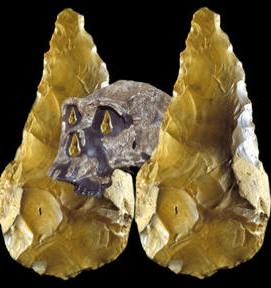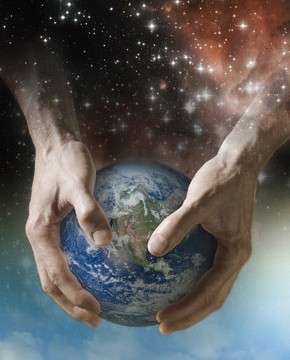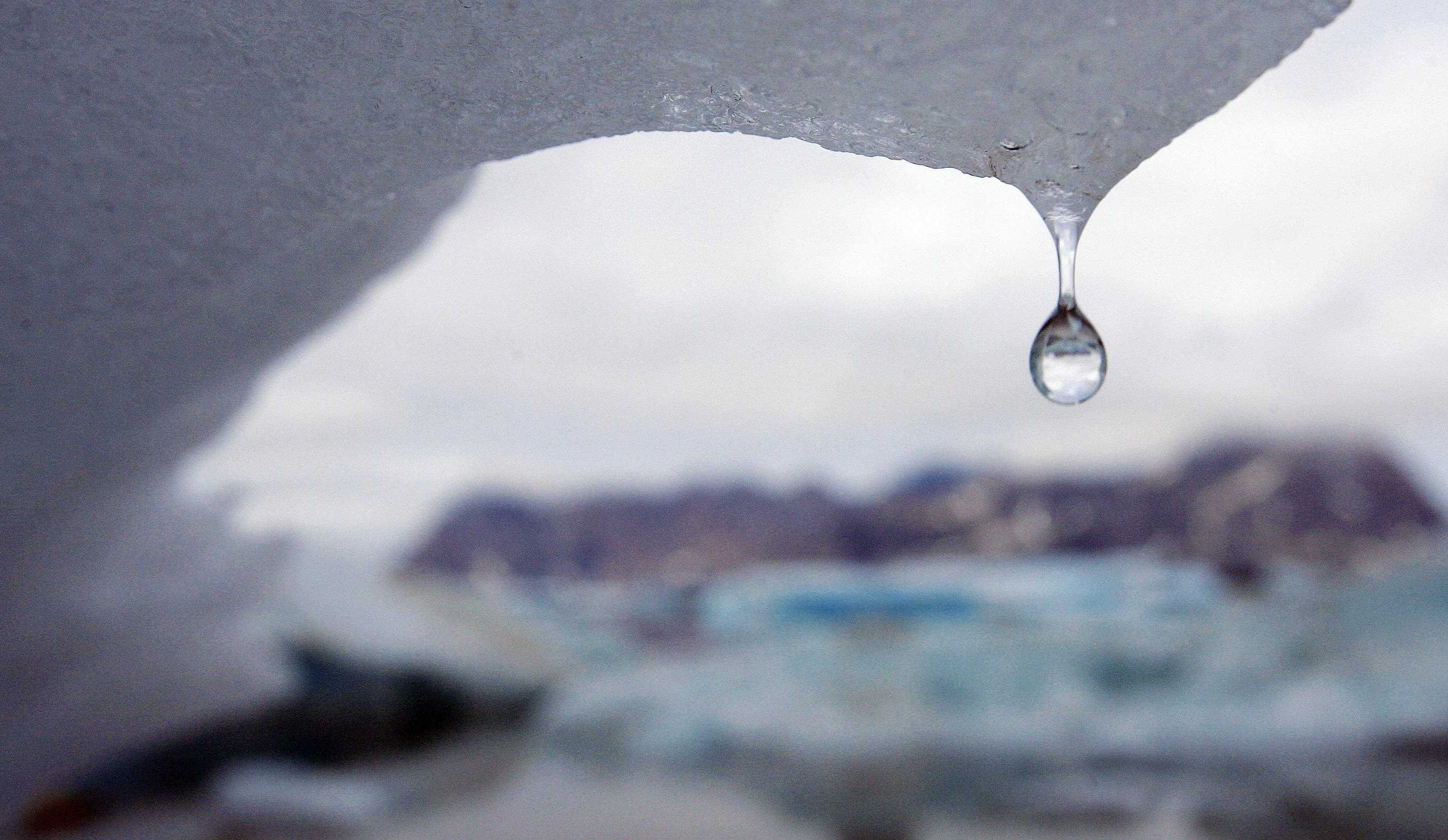How old is culture as we know it—culture as the former diversity of languages, customs and traditions? How old is consciousness as we know it–the underlying sameness of self, and the existential alienation of humans from nature?
 For hundreds of thousands of years, before modern humans emerged in eastern or southern Africa about 100,000 years ago, technology and culture changed very little. Simple toolkits of handaxes, choppers and scrapers, called the Acheulean, were used from about 1.6 million to 200,000 years ago. That’s nearly a million and half years of the same basic technology.
For hundreds of thousands of years, before modern humans emerged in eastern or southern Africa about 100,000 years ago, technology and culture changed very little. Simple toolkits of handaxes, choppers and scrapers, called the Acheulean, were used from about 1.6 million to 200,000 years ago. That’s nearly a million and half years of the same basic technology.
Paleo-anthropologists presume, with good reason, that pre-modern humans had an equivalent non-variation in culture throughout that period. It was only when the human brain attained a new level of complexity and capability that technology and culture became much more sophisticated and diverse.
Somewhere around 100,000 years ago, people with our capabilities emerged. If we could bring a normal baby from the point of first emergence of modern humans into the present, the baby would have all the capabilities of people today, and grow up indistinguishable from a person living in America, Costa Rica, or wherever. But go back before the threshold of modern humans was crossed, and we would find a severe limitation in linguistic and cognitive abilities.
Therefore we can presume that culture as we know it is about a hundred thousand years old, which is, non-coincidentally, when the first evidence of art emerges. This entire epoch—a hundred thousand years of human pre-history and history—appears to be coming to an end, both because ‘diversity’ has become a glossy word for a disappearing actuality, and because post-industrial man’s relationship to nature has become perilous.
We can also say with some confidence that consciousness as we’ve known it is about the same age, and perhaps precisely the same age as the emergence of diverse cultures. But whereas geographically distinct cultures produced geographically distinct peoples, the basic consciousness of humankind has been the same since the first fully conscious thought formed in peoples’ heads. We call it ‘human nature.’
What the vast majority of people can’t get their heads around (because getting our heads around things is precisely the problem), is that another order of consciousness altogether is available to us–if we do the daily spadework of self-knowing. The question is: Are we at the threshold of that transmutation?
Nationalists in America are cheerleading to an empty audience when they shout about ‘simultaneously  making America stronger, Putin weaker, the planet healthier and our grandchildren safer.’ Nationalists in Russia, hearing the cheers of a proud people told for a generation they were a defeated people, are living in a dangerous echo chamber.
making America stronger, Putin weaker, the planet healthier and our grandchildren safer.’ Nationalists in Russia, hearing the cheers of a proud people told for a generation they were a defeated people, are living in a dangerous echo chamber.
The human crisis is so far beyond countries that the former superpowers deserve little comment. Besides, when a place is denied to a people’s best, the space is filled with a people’s worst.
Though most people have lost sight of it, the earth gave rise to us just as it did all other animal species. However humans are so different from the rest of the animal kingdom that it was believed, in the formative years of the Western tradition anyway, that we were the special creation of God. Though that idea sounds quaint to the point of absurd to our ears, we in the West shouldn’t lose sight of the fact that the Genesis story was foundational in western civilization.
That foundation has rotted away. And without a foundation, no society, family, or person can stand. Which is why so many people, in North America and Europe especially, are sinking into the sand. We (not only in the West but worldwide) urgently need a new foundation. But denial still carries the day, and even the most educated people cling to the belief and hope that things aren’t as bad as all that.
Indigenous peoples had a more sophisticated view of their relationship to nature. They created myths that accounted for the gulf between humans and the natural world, myths that provided, until civilization came along and wiped them out, a semblance of harmony and balance with the earth.
That balance is gone. As the White House climate change report, which just came out, attests, “climate change, once considered an issue for a distant future, has moved firmly into the present.”
The word diversity has become synonymous with protecting what’s left of nature, and respecting differences between peoples. That’s fine, but you never heard Lewis and Clark talk about the diversity of animals and peoples. It was a given.
Now that natural and cultural diversity are disappearing fast, we must find out, during this perilous transition from one human species to potentially another, what made us human as we were, and what allows us to be the human beings we can be.
What it meant to be human was the psychological identification and cultural accretion that went with the tribe, whether as small as a clan or as big as a nation. What it means to be a human being is ending tribalism in all its decaying varieties within oneself, and awakening insight and wholeness within.
The individual can, through right observation, quiet the mind and the memory of 100,000 years. That is the essential action of meditation, and it has no method or technique. Attention opens space not just for the cleansing and renewal of one’s brain, but for the emergence of a new human being. There is no choice, since otherwise, there’s only darkness.
Martin LeFevre

